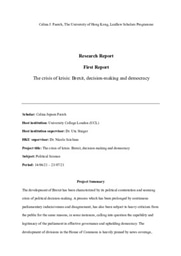Research Proposal
Project Title: The crisis of krisis: Brexit, decision-making and democracy
Host Department/Division/Unit: UCL Laws Faculty (European Institute)
Time period: 14/06/21 – 23/07/21
Supervision arrangement: I will undertake the work under the supervision of Dr. Uta Staiger (UCL) and as a part of her research Project the Crisis of Krisis: Brexit, decision-making and democracy. Research will be done remotely (online with one weekly meeting).
Research Question: What can we learn from vote results in the UK Houses of Parliament in this period; can we identify patterns and shifts over time?
Summary: The development of Brexit has been characterized by its political contestation and seeming crisis of political decision-making. A process which has been prolonged by continuous parliamentary indecisiveness and disagreement, has also been subject to heavy criticism from the public for the same reasons, in some instances, calling into question the capability and legitimacy of the parliament in effective governance and upholding democracy. The development of divisions in the House of Commons is heavily pinned by news coverage, public sentiment, and scholars as the manifestation of indecisiveness and crisis as they on multiple occasions have failed to come to agreement. To get a more informed understanding of the development of decision-making in Brexit, but also of the extent of crisis of political decision-making, mapping the voting record is crucial. It is relevant for any discussion and understanding of Brexit to ask Does the voting record, and its change over time, reflect the contestation and indecisiveness as portrayed by the media and public? How? What does the voting record tell us about the development of crisis? Which patterns of decision-making can we see from the voting record in this time of crisis? In response to the lack of a significant and substantial chronology and analysis of the House of Commons voting record during Brexit, this research seeks to establish such baseline.
Objectives:
- Collect and clean voting record data from the Brexit period in the House of Commons
- Map the development of political contestation and stalemate as reflected by the voting record of the House of Commons in the period of crisis from 2017 - 2020 on Brexit related divisions.
- Identify alternative data sources to assess stalemate and decision-making in the Brexit context.
- Identify significant changes in voting patterns over the period.
- Evaluate the extent and nature of crisis in decision-making as reflected by the voting record data.
Background: From the referendum until today, the Brexit crisis seems rooted in the inability of our political class – and society – to come to any decision on Europe at all. This research project investigates what such indecisiveness might tell us about the kind of crisis we are experiencing. Since, contestation has been portrayed not as sustaining democracy, but bringing it into disrepute. How might this shape or justify public and political demands for decisiveness? Could it have constitutional repercussions, as we argue over the scope of executive action, parliamentary scrutiny, and judicial review? Where does the power to take political decisions ultimately – and legitimately – reside? The project has several aspects. First, it revisits authors in the history of political thought to define the relationship of crisis and politics. Secondly, it reviews UK polls and parliamentary voting records between 2017 and 2020, in order to establish the extent of frozen conflict on decision-making on Brexit. Thirdly, it will review press reporting of different high points in the parliamentary stand-off. Fourthly, it will gather the views of political actors in Westminster and possibly Brussels, via qualitative interviews, in order to critically assess the trends and developments as well as their consequences for democratic standards.
- END -


Please sign in
If you are a registered user on Laidlaw Scholars Network, please sign in